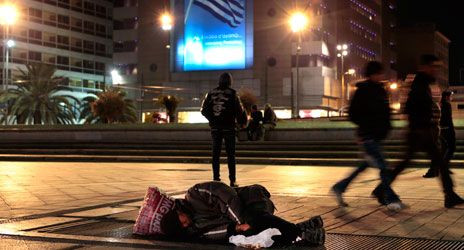A Cheap New Drug Decimating Greece’s Homeless As Economic Crisis Tightens Grip

In the massive economic misery that has engulfed Greece, the people at the very bottom of Greek society -- namely, the homeless of cities like Athens -- are being decimated by a cheap new drug called sisa, which is described as a kind of ”cocaine for the poor."
A report in Vice.com delineated how Athens’ swelling ranks of homeless and prostitutes have fallen prey to this new drug.
Bizarrely, no one is quite sure what all the ingredients are in sisa, although methamphetamine is definitely a core component.
But at only one or two euros ($1.29 to $2.58) per hit, it’s an attractive buy for the poor and/or homeless seeking any temporary escape from grim realities. For those who were already addicted to other, more expensive drugs like heroin or cocaine, sisa provides a far better value.
On a broader scale, Greek’s economic catastrophe -- which features, among other woes, a gargantuan 27 percent unemployment rate that has thrown tens of thousands of people into the streets -- has triggered not only more suicides, but higher rates of alcohol and drug addiction.
“Rates of drug and alcohol consumption ... as well as the associated mental health problems are set to rise the longer the recession continues,” Charalampos Poulopoulos, director of Kethea, a government-funded anti-drug organization, wrote in a report last year.
“Instability that results from widespread and increasing nationwide poverty leads to hopelessness, health problems and self-medication by way of street drugs. In the last two years, drug users have become more self-destructive, especially in the region of Athens where the effects of economic crisis are more obvious.”
Poulopoulos told Vice that the high from sisa is accompanied by dreadful after-effects, including insomnia, delusions, heart attacks and aggressive behavior. Other reported side effects are anorexia, palpitations and anxiety.
“It’s often compared with cocaine,” he said. “It’s the drug of the streets, produced in home-based laboratories.”
The Kathimerini newspaper of Greece reported that sisa also can enhance sexual desire in the user, thereby leading to higher rates of HIV among the homeless and street people.
A sisa addict named Konstantinos in Athens explained to Vice, “If you smoke it for six months, you’ll be dead.”
Another user named Stathis said that there are three ways one can consume sisa. “With a pipe, with a syringe or with a piece of aluminum, and I’ve seen people snorting it as well,” he said. “But let me say that if you shoot it, you don’t have long to live. It destroys all vital organs from the inside. For some [addicts], their innards rotted. ... It might give you other sorts of sicknesses; it might hit your liver, your heart, kidneys ... anywhere.”
According to TalkingDrugs.com, sisa is believed to have first appeared in Greece in 2010, deep into the country’s economic downward spiral. Initially, it was used mostly by immigrants coming from Afghanistan, Iran, Pakistan and India, as well as by native heroin users.
Kathimerini reported that the drug is principally manufactured in illegal labs in central Athens and that some immigrants may have been pressured by drug dealers to sell sisa on the streets as a way to survive.
GreekReporter.com noted that, as more drug addicts are forced into prostitution, the negative effects of sisa use are spreading into mainstream Greek society.
A street hooker named Maria said that most of her clients are middle-age, married Greek men who pay drug-addicted prostitutes 10 to 15 euros per visit.
“They usually buy sex in the morning, and they don’t use condoms,” said Maria, who is herself HIV-positive. “I refuse [to have] unprotected sex, but men become pushy, and it’s hard to say no.”
According to Greek NGO Klimaka, the number of homeless people in the country has surged by 25 percent since 2009. The Hellenic Center for Disease Control and Prevention, or KEELPNO, estimates there are at least 25,000 drug addicts in Greece, mostly in Athens.
“The situation is alarming as we have passed from four to five HIV infections among IDUs [injecting drug users] per year to more than 500 in less than two years,” said Marianela Kloka, director of Positive Voice, an Athens NGO.
“Budget cuts have worsened an already existing problem. Needle exchange programs have never been adequate, and there was a total lack of coordination among the different organizations engaged in harm reduction. Now that the financial crisis has changed the pattern of drug use and IDUs inject cheaper drugs several times per day, the need of greater needle coverage is urgent.”
Poulopoulos described the horrors if life for people at Greece’s margins. “There is a feeling of despair among drug users,” he said, according to Greek Reporter. “As all safety nets are tearing apart, users have lost their motivation to change their lives. And this also contributes to the rise of HIV infections.”
© Copyright IBTimes 2024. All rights reserved.





















